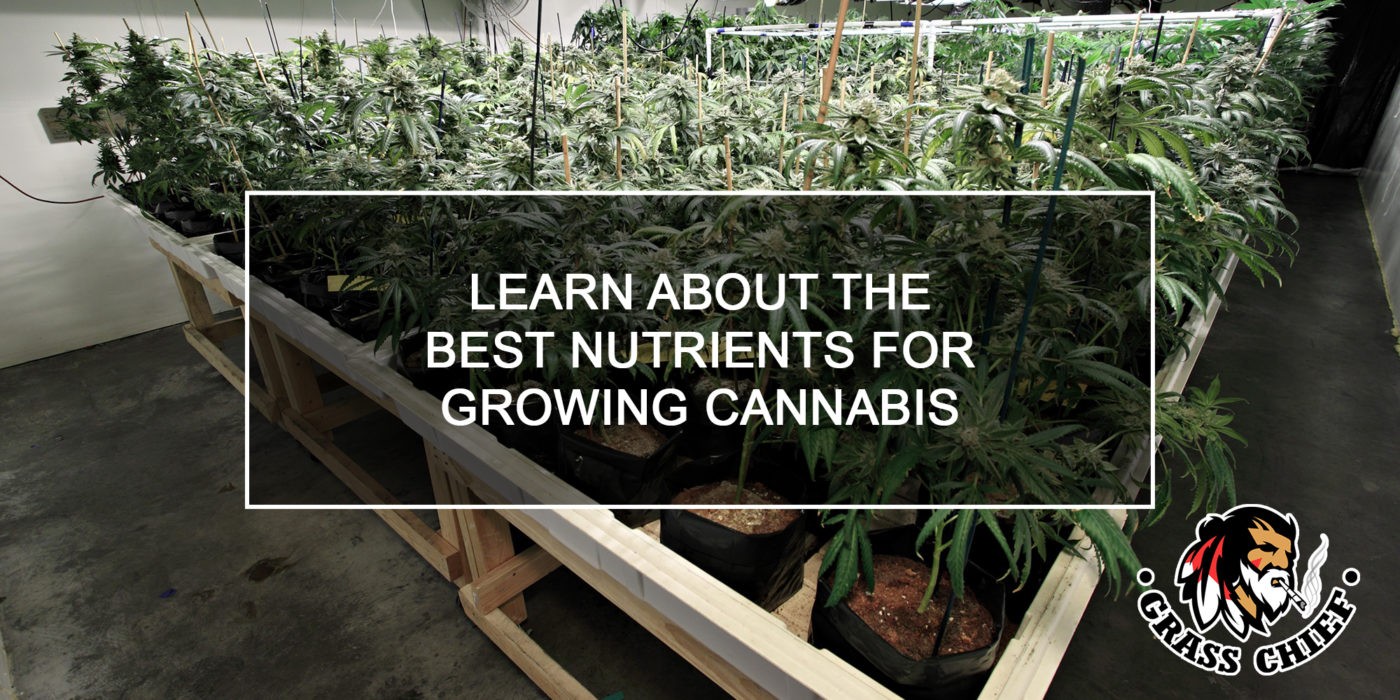Guide
Growing Cannabis- Learn About the Best Nutrients for Growing Cannabis
As more regions continue to implements amendments to reclassify cannabis and make it legal, you might gain interest in growing this infamous flowering herb. Cannabis has become quite popular over the last few years, thanks to new studies that indicate its medicinal benefits. You can also grow cannabis for its medical benefits or even cultivate different hemp strains for industrial application. However, regardless of your purpose, you must choose the best nutrients for growing your cannabis plants.
According to experts, there are various considerations to make before purchasing any nutrients or fertilizers. Some of the essential areas to examine include the system of cultivation you choose (soil, hydroponic), type of seed and strain, NPK ratios, and phase of farming (pre-ploughing, planting, weeding) among others. Understanding these areas will allow you to choose not only the best nutrients for growing cannabis, but also find ideal options for your unique needs. Here are a few insights to help you pick the right nutrients for your cannabis farm:
Choose the best NPK ratio for cannabis
NPK stands for nitrogen, phosphorus, and potassium. When looking for plant nutrients, you will find labels in the form of NPK ratios like “3-4-2.” The 3, 4, and 2 stand for nitrogen, phosphorus, and potassium levels in the nutrient. Each letter is within a scale of 1-15, with 1 representing the lowest nutritional value. Since all plants have different needs, there is no single best NPK level. The goal is to choose the best nutrient value for your plant.
According to studies, cannabis requires different nutrients during different phases of growth. For instance, during the vegetative stage, it requires high nitrogen and potassium and medium phosphorus. In the flowering stage, these needs change to low nitrogen, high potassium, and medium phosphorus. However, these requirements will depend on the soil condition, and climate outside, or water quality and properties if you are using hydroponic systems. Different strains may also require different NPK ratios. Most seed providers will include information about the soil condition and nutrient requirement.
Besides nitrogen, phosphorus and potassium, cannabis requires several other nutrients including calcium, magnesium and sulfur. You will also need small amounts of micronutrients like zinc, iron, manganese, chlorine, cobalt, silicon, boron, and copper. Each micronutrient plays a vital role in the growth of your plants. It is essential to know when to add a given nutrient. Phosphorus, for instance, is more productive during the flowering stages as it is responsible for the growth of full buds. Nitrogen, on the other hand, is an essential component of chlorophyll and plant amino acids. It is best for the vegetative phase when the plant requires more food and energy.
Soil vs hydroponic system nutrients
If you are growing cannabis in a farm, you will need to test the pH of the ground and find out which nutrients the plant will lack. You can use organic manure and fertilizer, although commercial nutrient formulas offer the best essential nutrients for your plant. The best option is to find humus-rich soils and potter’s soil for growing cannabis. These are also ideal when growing cannabis in a greenhouse setting. They contain non-inert compost, humus, manure and worm casting. However, these nutrients are available in non-soluble forms that require other microbes to digest them into compounds that the plant can take up.
You can also find non-organic soil nutrients although experts discourage such options as they can quickly build up in the soil eventually harming the soil life. Most nutrients sold online are for soilless hydroponic plants. You should always check the label carefully, especially if you are growing cannabis in outdoor systems that require seeding the plant in soil. It is also essential to examine your soil properties and know what you can add. For instance, if your soil already has adequate calcium and potassium, there is no reason to add these elements.
Another popular option for growing marijuana is through hydroponic systems. Unlike soil/ground plants, hydroponic cannabis grows in nutrient-rich water. If you use a hydroponic system, you will need to check the level of calcium in your water supply and make sure there are no contaminants in your setting. It is also essential to determine how to improve your plant’s nutrition and provide what it lacks from the soil. Make sure you purchase the right nutrient for the system you are using as soil nutrients may not necessarily suit hydroponic plants. Hydroponic nutrients come in either liquid or powder form. In most cases, you will need to dilute the formula before adding it into the water.
Choose organic nutrients
According to studies, all plants require natural nutrients to grow to their full potential. This might seem difficult to achieve if you cultivate large-scale industrial hemp. However, there is no reason not to use organic nutrients unless you are growing hydroponic plants. Organic nutrients can saturate the water with overgrowth of undesirable organisms in hydroponic systems. As such, you need to stick to hydroponic nutrients and fertilizer. Nonetheless, there are several other organic options for these systems. Make sure you are using natural environmentally-friendly fertilizer and nutrients.
If you are a first-time farmer, stick to organic nutrients as they are far more forgiving to the soil. You can use cheap options like blood and fish meal for nitrogen, bat guano and bone meal for phosphorus and wood ash for potassium. There are several other organic options you can add to your farm to ensure your plants blossom into full buds and healthy green leaves.
Considerations to make
Besides quality, there are various other aspects to brush through before making the final decision to purchase any nutrient for growing cannabis. Some of the crucial areas include:
a) Brand/company reputation
While finding cannabis nutrients should not be a daunting task, not all offers you come across will depict desirable properties. There are as many sub-standard quality formulas as quality options, if not more. The best way to determine if a given retailer or dispensary can meet your needs is through reviewing their market reputation. Reliable retailers that consistently provide high-quality seeds will attract a thriving reputation in the area. You can start by looking up customer reviews and expert ratings. Pay close attention to the complaints to gain more insight into the merits and demerits of choosing any particular nutrient brand.
b) Price
Price is usually the last determinant you need to review. Nutrients come at different prices depending on the brand, formula and various other factors. If you are on a budget, there is no reason why you should spend a lot of money on cannabis nutrient. There are subtle differences between expensive and non-expensive brands, depending on the setup.
Your priority should be to find the best quality nutrients for your strains. Compare existing options within your budget range and narrow down to the most reliable offers. You can also invest in high-end brands and some cheap quality to test the differences. This is an effective way to determine which brands work best with your setup.
c) Formula nutrients
NPK and micronutrient ratios are important when choosing nutrient for growing cannabis. Each brand comes with a range of nutrients and other compounds. When looking for nutrients, you should review all compounds and ingredients in the label. As a novice cannabis farmer, it will take a few tries before you get the best combination for your setup. Reading through the label and understanding how each ingredient benefits your plants will help you come up with a reliable combination. You should also take time to learn why certain compounds suit specific phases of growth.
d) Form of nutrient
Plants take up nutrients in different ways. Most hydroponic nutrients come as concentrated mineral salts in liquid or powder form. Dry water-soluble hydroponic nutrients offer longer shelf-life than liquid forms. You can also find non-NPK solid-state organic nutrients. The form you choose will depend on your unique requirements and setting. Most nutrients require dilution and indicate the amount of water you should use. Whether you pick powder, solid or liquid nutrients, make sure they offer the essential ingredients your plant needs to flourish.
Conclusion
Choosing nutrients for your cannabis plant should not be a daunting task once you understand the plant’s requirements and what is inside the pack you purchase. There is no single best nutrient brand or pack for everyone. If you cultivate industrial hemp, your priority will be to grow plants rich in fibre; bud size will not be such a primary concern. However, if you are planting medical-cannabis, bud size and quality is one of the priority concerns. As such, it is important to outline your requirements and know exactly what your plants need to get the projected yield.
More importantly, you should learn how each ingredient affects your plant’s health and growth. This will make it easier to find reliable nutrients that can help you grow your cannabis to their full potential depending on what you intend to achieve.


